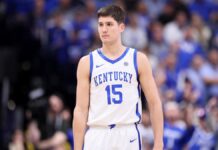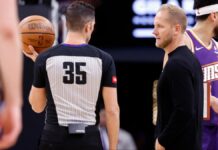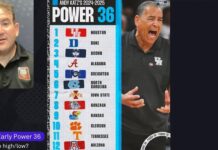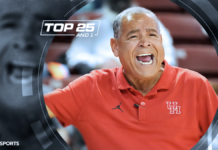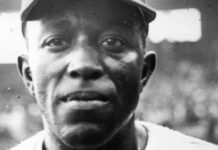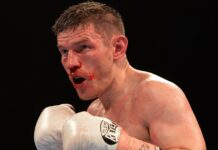Bernhard Langer stood toward the back of the tee box on the first hole of los maestros in November and watched Rory McIlroy launch his opening tee shot of the third round 322 yards. Moments later, the 63-year-old Langer hit his — 251 yards.
The differences between the two were greater than just the 71 yards marked off between them.
“They just play a different game,” Langer, a two-time Masters champion, remembered saying to himself. I’m not familiar with this.”
Langer both understands and embraces his limits as a golfer. Maybe it’s because of his age. Maybe it’s because he has been a professional golfer for the past 45 years. Maybe it’s because he has won 83 times combined on the European and Champions tours.
And, every year, Langer, who has won 83 times around the world, gets reminded of it as soon as he drives down Magnolia Lane. Yet, the difference in age and length — he was 42 yards shorter than playing partner JT Poston over the first two rounds, 55 behind McIlroy in the third and 64 in back of Bryson DeChambeau on Sunday.
Still, Langer became the oldest player ever to make the cut, beat DeChambeau by two strokes on Sunday and finished tied for 29th in his 37th Masters appearance.
“It’s fun to compete with these young guys every once in a while,” Langer said. “I wouldn’t want to do it every week because it would get a little frustrating on some of these courses. But, I feel I can still compete with them.
“I just don’t have the long tee ball they have.”
Next week, even as the age and distance gaps continue to widen, he will try to break his own record and make the weekend once more. Once in the fairway, he will hit first after watching tee shots from DeChambeau and McIlory and every other player in the field sail past his tee ball.
“If you had given me the equipment they have now in my 20s, I would have hit it quite a ways, too,” he said.
At last year’s Masters, Langer often found himself playing three clubs shorter than his playing partners. When they were hitting irons, he had a hybrid in his hands. When they were attacking Augusta National’s par 5s, he was laying up.
“I have to play extremely smart and extremely well,” Langer said. “I have to make up for it in other ways. And, almost, it’s like playing chess. There’s a few holes where I have to almost go backwards. Like, ‘Oh, the pin is here, so I can’t go for that pin with a 2-hybrid or 3-wood.’
“So, if I go for it, I have to miss it here or there to get it up and down. So, it’s difficult and it’s, in a sense, frustrating when you see they’re coming in with a 9-iron and they slide it right there and stop it. I’m coming in with a 2-hybrid and I have no chance. But it’s also a challenge.”
What Langer lacks in distance, though, he makes up with his experience, acumen and “local knowledge,” having played Augusta National for almost four decades. He knows the contours of the greens, the places he can hit and the areas every player has to avoid.
“There are certain mistakes that you can’t make, right?” Poston said. “And he was so good about knowing exactly where to hit it and knowing that you’re better off missing the green in this place than maybe hitting the green and having a difficult two-putt.”
Langer led the tournament in driving accuracy, hitting 87.5% (49 of 56) of the fairways. He was tied for fourth in putting.
“He just manages his game so well around there,” McIlroy said.
While so many on the tour are chasing more distance — and trying to keep up with DeChambeau — Langer is playing his game, his way.
“There’s sometimes a danger you play with somebody that hits it a lot further,” he said. “You would either get frustrated or want to become like them. And that’s always a danger. I think you need to be faithful to what you have and then you got to be brutally honest with yourself and say, ‘OK, let’s say I’m a decent ball striker but my putting stinks, or my chipping is awful, or whatever it may be.'”
Langer’s coach, Willy Hoffman, with whom Langer started working at 18 years old, tweaked Langer’s swing in his 20s and 30s. The idea was to take pressure off Langer’s back, which he injured when he was 19 while training for the German Air Force, so that Langer could be able to keep playing into his 40s, 50s, 60s and, at this rate, maybe even his 70s.
“You look at some of the young guys now and you wonder if they keep doing this, can they sustain what they’re doing or do they have to make adjustments to be playing in their 50s and 60s?” Langer said.
While DeChambeau has gone heavy on protein shakes and steak, Langer has maintained the same approach he has for decades.
“I always say I’m on the ‘see food’ diet, which means whatever food I see, I’ll eat,” he joked.
Langer began paying close attention to his fitness at 19, when he suffered a back injury, which caused a stress fracture and bulging disk. He was in the hospital for five weeks. He focused on stretching and a controlled cardio program. More than 40 years later, Langer still has the same approach to his workouts. When he’s on the road for tournaments, Langer will get to the course about three hours before his tee time and spend an hour in the fitness center. He’ll ride a stationary bike for five to 10 minutes to loosen up, then get stretched by a physical therapist on-site for 15 to 20 minutes, then spend another 20 minutes going through exercises for his abs, shoulders or legs.
“He’s amazing,” said Jim Furyk, who at 50 has remained competitive with the younger crowd despite now being old enough for the PGA Tour Champions. “We like to say he’s a machine. I guess he’s a German machine, which is a finely tuned machine.”
All these years later, Langer believes he’s experiencing the benefit of taking his health seriously throughout his career.
“It really pays off later in your life,” he said.
Langer first arrived at Augusta National in 1982. Since that first trip, he has won twice — in 1985 and 1993 — posted under-par scores in more than half of the tournament rounds he has played and made the cut 26 times, including six times since turning 50. So it makes sense that those searching for that first green jacket — or even past champions looking for another one — pick his brain.
“They ask questions nonstop: ‘Why this?’ or ‘Why that? How would you do this and that?'” Langer said. “And so I’m always happy to share what I’ve learned through the mistakes I’ve made.”
He’s had a successful ride, and not just at Augusta National. His career in golf began at age 9, when he caddied at Augsburg Golf Club. He made 2.50 deutsche marks (or about $1.50) for nine holes, 5 for 18. From what he called a “very poor” family, every little bit helped. Eventually, he started caddying for the club champion, who took a liking to the young guy carrying his clubs. Langer, who likes to joke he fell in love with money first and golf second, began to pay attention to his own game. By 15, he was the assistant professional at Munch Golf Club. At 17, he won a national tournament. When he was 18, he joined the European Tour.
“I still have to pinch myself,” Langer said. “The thing is, where I come from, a little village in Bavaria in Germany, where golf was nothing, people didn’t even know about golf. They thought it was miniature golf, putt-putt. To have the career that I’ve had and still play at competitive level at age 63 — 45 years later — it’s pretty much unbelievable.”





















